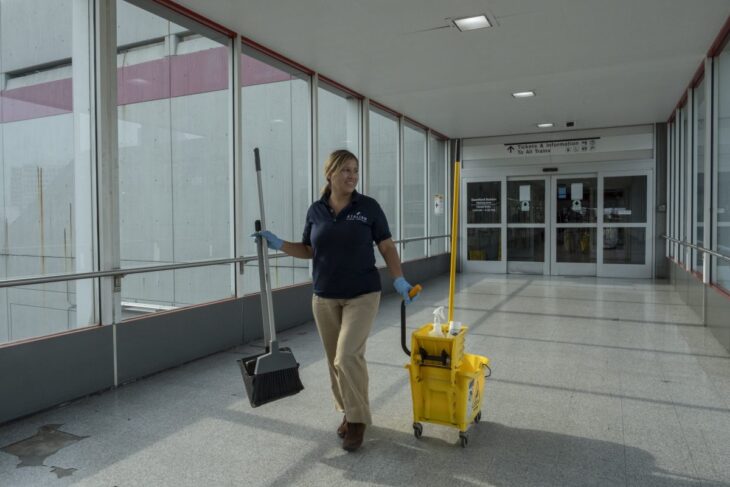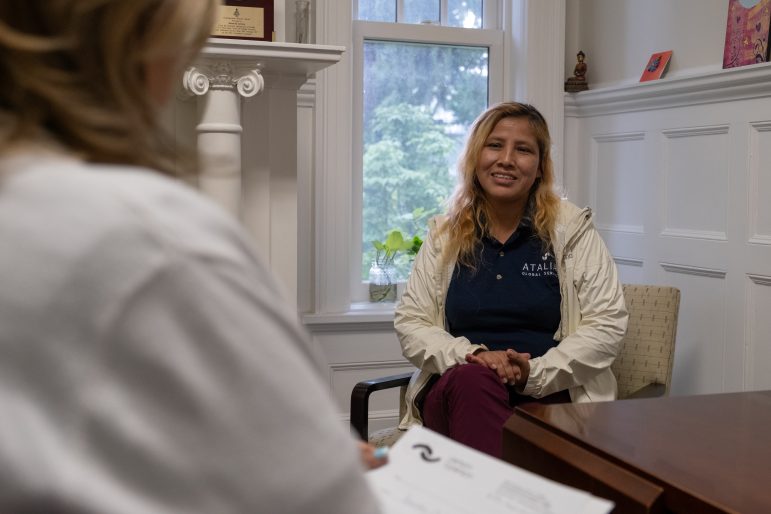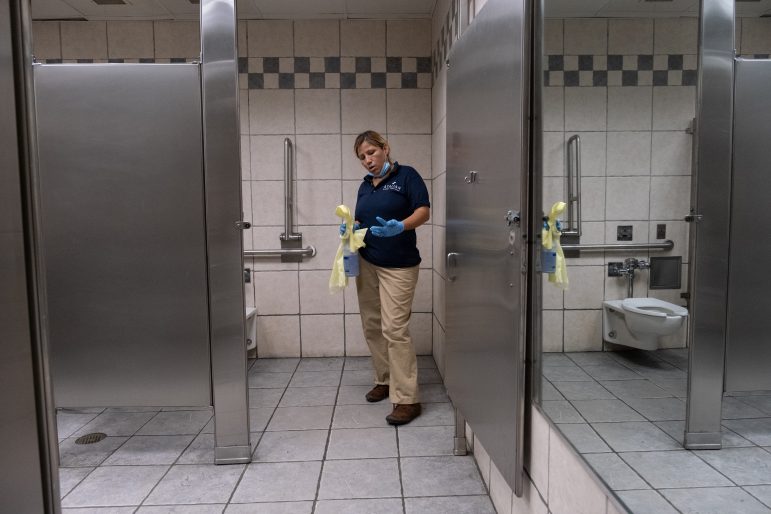
Lourdes Carhuayna recently graduated from a job training program she enrolled in with the help of Person to Person. The nonprofit’s Financial Opportunity Center works with many people who are already receiving assistance, making career training and financial coaching available after first meeting the families’ needs. SHAHRZAD RASEKH / CT MIRROR
State, nonprofit programs try to tackle multiple issues families face at once, from housing assistance to financial resources
For decades, the social services nonprofit Person to Person, housed on the campus of Saint Luke’s Episcopal Church in Darien, has provided food, clothing and emergency cash assistance to thousands of Fairfield County families in need.
This year, the organization added a new service aimed at helping many of those same clients find and pursue career opportunities, providing financial coaching as families move toward self-sufficiency. The program quickly surpassed its planned enrollment of 150 clients for the pilot year.
“A lot of the clients that we’re working with are really interested in the career coaching piece,” said Lauren Franciamore, chief programs officer at Person to Person. “We are seeing a lot of interest.”
The program is known as a Financial Opportunity Center, a model conceived by the nonprofit Local Initiatives Support Corporation now operating in 130 locations around the country — half a dozen of which are in Connecticut. Program caseworkers help clients enroll in career training, navigate a new job or career, access income support like food assistance or subsidized child care and health care, establish a household budget, pay off debt and set long-term financial goals.
“If you really want to help people move up, it’s not enough to just do one thing. You have to do several things together,” said Jim Horan, LISC’s executive director in Connecticut. “If you do these things together, it’s going to have a much bigger result than if people just access one of those services by itself.”
Connecticut employers stand to benefit from more trained people entering the workforce. The state still hasn’t recovered all of the jobs that were lost at the onset of the pandemic. In fact, after reaching a peak in January 2022 of nearly 1.96 million people, the state’s labor force — that is, people who are working or looking for work — has since declined by 60,000.
Poverty could be one of the obstacles keeping people from entering the workforce — or forcing them to leave it. In U.S. Census surveys, working-age people living below the poverty line and not working commonly say illness, disability or “home or family reasons” keep them from pursuing work.
Those particular challenges are especially costly to overcome. Medical care, housing and child care are among the biggest expenses for American families.
And they’ve all become costlier as a result of recent inflation, the lack of adequate housing stock, and the end of eviction moratorium and federal emergency funding. According to the United Way of Connecticut, a family of two adults, one pre-schooler and one infant, needed to earn $106,632 in 2021 (four times that year’s federal poverty level) to cover a basic survival budget.
Nancy Coughlin, Person to Person’s chief executive, said that, since COVID, more of the agency’s clients are now dealing with large medical debts. Many clients hold hourly jobs, but their wages haven’t kept up with inflation, making it difficult to cover their expenses.
“The level of need and the type of need that our food pantry clients and our [emergency financial assistance] clients are seeing is really fundamentally different than it was before the pandemic,” Coughlin said.
In acknowledgment of the barriers would-be job seekers are facing, state-funded workforce development efforts recently began including support for “wraparound services” as part of career training programs.

The Manufacturing Pipeline Initiative, designed by the Eastern Connecticut Workforce Investment Board to train people for jobs at submarine manufacturer General Dynamics Electric Boat and its parts suppliers, offers participants reimbursements for rent, transportation and child care.
Individuals who enroll in the state’s CareerConneCT workforce development program, which provides free, short-term skills training and job placement, are eligible for up to $15,000 in rent assistance, as well as child care and transportation assistance while they complete training.
“Many CareerConneCT participants face multiple obstacles to participating in training programs,” Kelli-Marie Vallieres, the state’s chief workforce officer, said in a statement. Cash assistance for housing is something “many of our participants need to successfully complete training programs that put them on a path to meet their career aspirations,” she said.
Connecticut also recently extended time limits for families receiving federal welfare cash assistance, known as Temporary Assistance for Needy Families or TANF. The state’s 21-month lifetime limit on cash assistance was the second-shortest among the 50 states, but the legislature this year adopted a measure extending the limit to 36 months and raising the qualifying income and asset levels for families applying for 6-month extensions.
The public and private models differ philosophically. Connecticut’s career development programs and federal welfare assistance require participants to be actively pursuing work in order to qualify for the benefits offered. Person to Person’s Financial Opportunity Center works with many individuals who are already receiving assistance, making career training and financial coaching available after first meeting the families’ basic needs.
And the FOC program requires a two-year commitment. “It’s an agreement between us and the client, and they say, ‘Yes, I want to invest the time and energy to commit to checking in with caseworkers and participating in this one-on-one,” Coughlin explained. “The goal is we’re going to help them get through some workforce training programs, we’re going to help them with some savings. They’re going to be better off, but it is a commitment on their part as well as ours.”
Finding security
Earlier this year, Lourdes Carhuayna made that commitment.
She’d been struggling to provide stability for her two children, now 6 and 4, after earning a visa to immigrate to the United States from her native Peru via lottery when her younger child was an infant. Carhuayna came seeking opportunities for her children, but the first years tested her.

Initially, Carhuayna and her children were staying at a shelter, but they kept getting sick. For several months, as she was still nursing her younger daughter, the family of three frequently slept in Carhuayna’s car. Her older son became depressed, and the instability weighed on all of them.
During that time, she tried to work, but her children were frequently sick, and she needed to care for them. “So many things I remember from that very hard time,” she said, in Spanish.
Carhuayna shared a story of her first night in the United States. It was two years before she won the visa lottery. Pregnant with her son, she’d entered the U.S. on a tourist visa and made her way to New York, but she got lost and landed in the Stamford train station. After spending the night there, a security guard helped her find a place to stay.
Eventually, Carhuayna obtained a Section 8 voucher for housing, moved into an apartment and found Person to Person, where she obtained food and clothing. The organization was also generous with toys for her children, she recalled. And after getting on her feet, Carhuayna’s caseworker recommended the Financial Opportunity Center program.
When Carhuayna learned about the FOC, she knew right away what career she wanted to pursue. This spring, she completed a security guard training course, and she’s now working at the Stamford train station, doing maintenance while she studies English so she can qualify for a security guard position. Someday, she’d like to work for the police department.

Carhuayna described herself as justice-minded and she said she knows how important it is to feel secure. “I have a personality that can take great care and observation,” she said, in Spanish.
“I like security a lot.”
Source: https://ctmirror.org/2023/10/03/ct-person-to-person-workforce-development-career-assistance/
